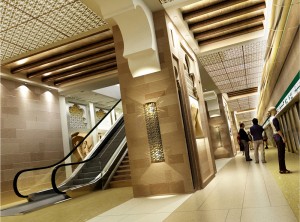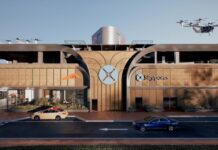By Shafaat Ahmed www.khaleejtimes.com
True to its status as the leading metropolis, Dubai has set goals in the field of environment safety and sustainable transport, with specific targets set to reduce emissions from vehicles.
 With emission from vehicular transport being one of the top threats to the environment, the Roads and Transport Authority (RTA) has developed a strategic to plan to increase non-polluting trips by at least 20 per cent by 2013.
With emission from vehicular transport being one of the top threats to the environment, the Roads and Transport Authority (RTA) has developed a strategic to plan to increase non-polluting trips by at least 20 per cent by 2013.
Under the directives of His Highness Shaikh Mohammed bin Rashid Al Maktoum Vice-President and Prime Minister of the UAE and Ruler of Dubai, the authority has chalked out a detailed plan to implement the strategy.
Apart from encouraging public transport modes that are low on emission including metro and buses, the RTA is planning to develop cycling and walking-only zones in order to further improve environmental standards in Dubai.
Speaking exclusively to Khaleej Times, Nasser Abu Shehab Director of Strategic Planning at RTA, outlined the green initiatives planned by the authority.
“Two of our eight major goals are directly related to enhance our environment, which are ‘shift from cars to public transport’ and ‘ensuring safety and preservation of environment’. Our plans, projects and practices are all aligned with our strategic goals and hence are environmentally friendly,” said Abu Shehab.
In order to realise its vision of a better environment, Abu Shehab said, the RTA has developed a Health, Safety and Environmental (HSE) Policy.
“RTA is committed to take all necessary environmental considerations in all of its activities of design, construction, operation and maintenance of transport infrastructure and services including roads, rail, marine and public transport systems. Most of our agencies have developed Environmental Management Plans and Systems of their own, which speaks volumes about our commitment.”
Translating the commitment is the RTA’s action plan to develop non-motorised transport modes such as cycling and walking in the city as well as other modes that are known to have zero emissions.
There is an action plan to improve the mobility of pedestrians in the city and RTA has set a target of increasing the number of walking trips by at least 20 per cent by 2013.
The RTA has also developed a climate controlled pedestrian walkway ‘pedway’ strategy to extend the walking and cycling catchment areas for public transport stations. Similarly the cycle infrastructure is part of our Strategic Plan, which will spread across the city in order to promote safe and healthy environment for cyclists in the city.
Also part of the RTA’s environment strategy is the use of recycled material in its construction projects. “We currently in talks with Emirates Recycling company to test the recycled asphalt and sub-base material for construction of roads. The recycled sub-base or commonly known as ‘crushed aggregates’ are locally produced from Construction & Demolition waste. Furthermore, the recycled asphalt is also being used to maintain certain types of roads in Dubai.”
Dubai Metro
Coming back from future, one of the brightest beacons of RTA’s present green credentials is the Dubai Metro.
Metro by its nature is an environmentally sustainable mode of transportation. It operates on clean fuel (electric) with advanced features such as regenerative braking, which regenerates electricity while slowing down to fuel other trains in the fleet.
“The Dubai Metro was founded on a Plan (i.e. Environmental Impact Assessment) that was conscious of sustainability requirements from day one. The construction of Metro had due regard for all environmental considerations – i.e. dust control, ventilation, noise control, etc. – by use of modern equipment. Our stations are very energy efficient with state of the art insulation features,” added Abu Shehab, enlisting the finer points that were taken into consideration while construction of metro.
The concept of energy conservation in the Dubai Metro is based on choosing the best power techniques and energy efficient equipment distribution. The practice is based on following main principles:
õ Utilising the regenerative power generated during train braking. This re-generated power is used by trains during the acceleration mode.
õ Air conditioning at stations and depots is provided through the District Cooling technology which has higher energy efficiency.
õ Highly efficient electromechanical equipment are used along with fully integrated energy control system at all Metro systems to conserve energy.
Public Buses
With the shifting of individual motorists to public transport being one of RTA’s prime objectives, the authority is constantly seeking to improve the quality of bus services as well its fuel efficiency and green credentials.
RTA’s latest fleet of buses is fitted with engines of Euro IV standards and operate on special diesel that contains only 50ppm sulphur i.e. 10 times less than the normal diesel which contains 500ppm sulphur.
“The new bus fleet is manufactured with Euro IV standard engines which are the most eco-friendly version as these engines minimise emissions by use of Selective Catalytic Reduction technique as well as Exhaust Gas Recirculation,” explained Abu Shehab.
Water Transport
As water transport is one of the oldest and popular mode of transport in Dubai, the RTA is planning to improve its efficiency as well.
With energy efficient waterbuses already proving to be successful and the water taxis also boasting of green credentials, RTA is now working on models of environmentally-friendly Abras.
“We have launched the Rowing Abra that uses small electric engine instead of a diesel engine, which considerably reduces the environmental impact. We are also studying and piloting feasibility of CNG Abra. This is expected to have a great environmental impact because if the trial succeeds this Abra shall have zero emissions, reduced noise pollution, and will have same or even more efficient maneuverability. However, this will require specially designed and manufactured engines for the current Abras, which is currently being worked out,” said Abu Shehab.
Coming from an oil-producing economy this multi-pronged sustainable transport policy is indeed significant and if successfully implement will be a benchmark for the region’s other big cities to follow.



















